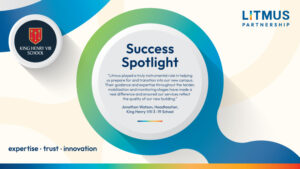There’s a long-standing connection between what we eat and how we perform mentally. While it might be tempting for students to turn to caffeine-fuelled all-nighters and last-minute cramming ahead of exams, the truth is that food – the right kind of food – plays a crucial role in supporting students through their studies.
At Litmus, we work closely with universities and further education providers to help them deliver catering strategies that reflect the diverse needs of their student communities. And yet, one area that’s still often overlooked is the role nutrition can play in academic performance. Mark Kassapian, Managing Director at Litmus Retail, shares his thoughts.
The opportunity: feeding the brain
Students learn in different ways – and they eat in different ways too. Providing a variety of nutritious, appealing food choices, at flexible times of day, should be a key part of any campus-wide wellbeing and performance strategy.
The benefits of brain food are being recognised in the wider retail and food service space. M&S recently launched its own brain food range and Creed Foodservice launched its Brain Food campaign last year, encouraging schools to offer food that actively supports cognitive performance and energy levels.
One of the most helpful things universities can do is to recognise that students don’t all work – or eat – on the same schedule. Offering hot food, healthy snacks, and drinks from convenience stores or smart fridges in high-traffic areas like libraries is a great start. Vending solutions with hot serve capabilities or microwaves for reheating meals can also provide out-of-hours support during peak exam periods.
Extending opening hours in units adjacent to libraries or study hubs can be another low-cost, high-impact move – particularly in the lead-up to key submission deadlines.
Support when it’s needed most
Food can be more than just fuel; it can be a small act of care. Offering discounted ‘exam meal deals’, prepaid meal packages, or special exam-time breakfasts to refuel after a late-night studying, could make a real difference to both wellbeing and academic outcomes.
And don’t underestimate the power of information. Use your digital channels and food counters to share quick hydration and nutrition tips that help students make smarter choices in the moment.
Practical next steps
Here are a few ideas universities can implement quickly and effectively:
- Partner with suppliers to introduce a brain food range tailored for students
- Trial an exam-season breakfast (with free-from and grab & go style options) to support those pulling late nights
- Use smart fridges, vending, or heat-to-eat meals in 24/7 study zones, without impacting staffing or rotas
- Offer “buy 5, get 1 free” deals on healthy meals during exam periods
- Create social media content that links food choices to focus and memory
- Highlight hydration stations and promote refill culture around campus
A student’s studying outcomes don’t come down to food alone – but it’s an undeniably important piece of the puzzle. By making small, strategic changes to how food is provided during the most stressful parts of the academic year, universities can send a clear message: we support you and we’re fuelling your success.
To hear about how we could support your university catering, get in touch here
The Litmus team











